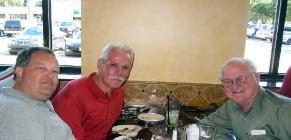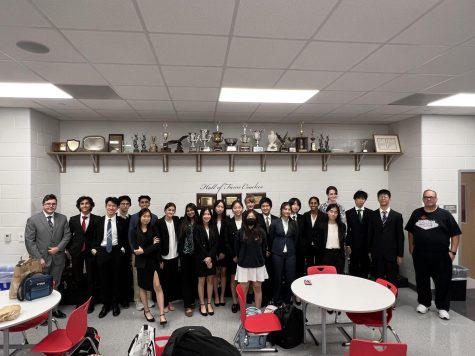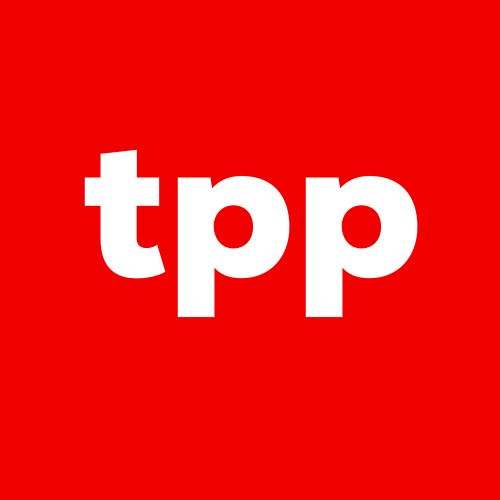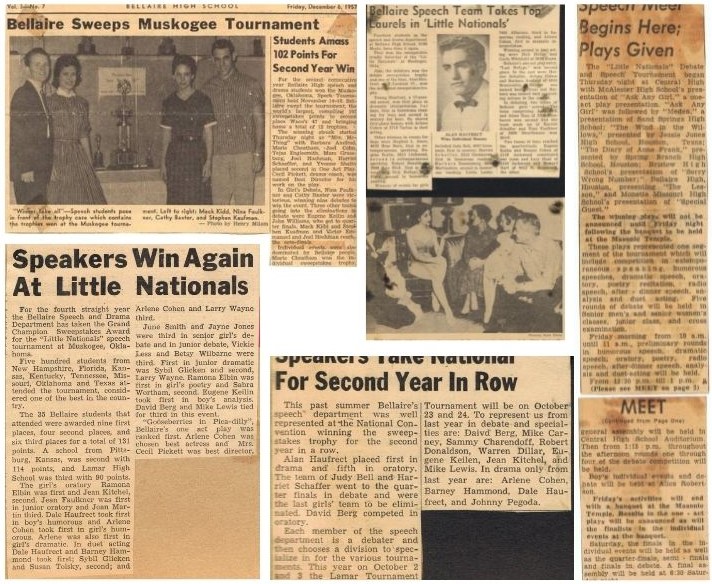The best game in town: A look at Bellaire Debate’s 66 years of success
Oct 24, 2022
From its start, Bellaire Debate achieved excellence, winning sweepstakes for four straight years (‘57, ‘58, ‘59, ‘60) in the ‘Little Nationals’ in Muskogee, Oklahoma. The first head coach, Mollie Martin, came to Bellaire from Oklahoma then the center of speech and debate.
In the final round of the tournament, a precocious 16-year-old debater stunned her opponents. Her questions were quick and her case unfamiliar.
If she won this, she would win what was then the Rose Bowl of high school debate. In 1965, at the 10th Annual Bellaire Forensic Tournament, Liz Herring, now known as US Senator Elizabeth Warren, did win.
The host of one of the largest high school debate tournaments in the nation that has drawn in competitors like young Elizabeth Warren 57 years ago, Bellaire Debate has continued that tradition of excellence every year even up to now when it held its 67th Annual BFT three weeks ago and its novice teams closed out the finals.
As one of the few public high school tournaments offering the sought-after University of Kentucky Tournament of Champions bids, this year’s Bellaire Forensic Tournament was split into two parts. Boasting teams from 30 schools, the first part was designated for TOC Congress bids while the second part for the TOC Public Forum bid tournament will be held Nov. 4-6.
In 2000, the National Speech and Debate Association secretary James M. Copeland called Bellaire one of the top 10 debate schools in the 20th century. And, during the height of the pandemic in 2020, its tournament drew over a hundred high schools from 23 states and even China.
In the eyes of former head coach David Johnson and current coaches Jay Stubbs and Avis Yen, it has been and still is the ‘most successful program at Bellaire.’ With all five of its head coaches inducted into the NSDA Hall of Fame and dozens of its debaters qualified for NSDA Nationals each year, Bellaire Debate, according to Stubbs, has been ‘consistent and consistently excellent.’
THE PAST
Founded in 1955 by the first head coach Mollie Martin, the program began its path toward excellence, securing sweepstakes for four straight years (‘57, ‘58, ‘59, ‘60) in the ‘Little Nationals’ held in Muskogee, Oklahoma, then the dominating center of debate and speech competition.
“When Mollie Martin coached, it was just a different thing,” Stubbs said. “Not as many schools did debate back then, so Bellaire was participating on what was then the national circuit. So, she was certainly groundbreaking and had excellence in mind.”
Hailing from Oklahoma, the reputable Martin coached national qualifiers and champions, and among those debaters was also the first Bellaire student to be accepted into Harvard.
“She had a good reputation for coaching in Oklahoma,” previous and third head coach David Johnson said. “And, Bellaire’s own reputation was clearly made on the first seven blocks of Meyerland. Back then, all sorts of magazines said Bellaire was the most wonderful neighborhood in America. Vice President Richard Nixon even came to cut the ribbon for the opening of Meyerland’s housing development.”
Working alongside Martin, Bellaire’s first drama director Cecil Pickett coached his own fair share of nationally-qualified students in speech events like one-act plays and Original Oratory.
“The fifth person who was inducted in the NFL [NSDA] Hall of Fame is a gentleman named Cecil Pickett,” Stubbs said. “Speech and Debate went together back then, but these days, they’re kind of separated. Cecil had coached the Quaid brothers, Randy Quaid, coached Brent Spiner, who was on Star Trek: The Next Generation. There are several big-name people who came through Bellaire that Mr. Pickett coached.”
After six years of coaching the program she started, Martin retired, handing it down to Dr. Bill Henderson. Like Martin and Pickett, Henderson came from a nationally competitive high school debate program in Oklahoma. He carried on the success of Bellaire’s program in his eight years as the second head coach, earning an NSDA top overall school award.

“He was extremely competitive,” Johnson said. “He died about three or four years ago. But, he was a high school and college debater himself, very knowledgeable and a very, very good coach. Bill Henderson, Mollie Martin and Cecil Pickett all took coaching debate very seriously. And, the principal they had, Harlan Andrews, who first opened the school in 1955 had been a high school debate coach himself, so he had more than a little bit of an interest in the program.”
Stubbs said because of Andrews’ support, Martin was able to set the groundwork for the program and its future success.
“Mr. Andrews allowed her to build that program to achieve excellence and gave them the opportunity to not only compete locally, but to compete against schools from Oklahoma and Louisiana,” Stubbs said. “And, our kids did very well. Out of the 66 years, we’ve gone to nationals 64 times.”
Besides strong support by past principals and their administrations, Johson said the quality of Bellaire’s academics and teachers in the ‘70s and ‘80s also bolstered the program’s success.
“When I taught, we had a tremendous amount of smart women who had been captured by education,” Johnson said. “The woman who taught typing in shorthand at Bellaire when I came there was a Phi Beta Kappa, had a Masters in Romance Languages from Rice and had been a French reporter for the New York Times. You probably couldn’t find a smarter, better-educated shorthand typing teacher anywhere in the US.”
But what the debate program did not lack in success, it did lack in school funding. It had to raise money by selling ads in TIME-magazine-themed advertisement booklets for each annual Bellaire Forensic Tournament. Even though the program lacked financial support, Stubbs said it was still “the most successful program in Bellaire’s history,” yet it was overlooked.

“It’s still one of the top programs in the country,” Stubbs said. “But, if you were to ask the common faculty member, they might say a given sport may be the most successful program that we’ve had. And, when I came here in 1999, Bellaire baseball had won their 7th national championship. But, we’ve won nationals and had kids in the final rounds of nationals many more times.”
Stubbs has not been the only coach to have nationally qualified debaters each year. Each coach before him has experienced just as much success. Back when Johnson was coaching, debate was the only chance for a student to even be a national champion.
“For all the years I’ve coached at Bellaire, the only national championship that schools participated in was speech and debate,” Johnson said. “And, that’s because the National Association of Secondary Schools allowed a national competition in forensic speech and debate and nothing else. Basketball, football and even swimming were not involved at the national level. Only speech and debate was.”
With a rare opportunity to compete nationally, the Bellaire debate program under Johnson dominated the national circuit just like in the program’s beginnings.
“We had an extremely competitive and successful program during the period of time that I was there,” Johnson said. “I came in 1970 and left by 2000. During those 30 years, we won one revolving sweepstakes trophy and won a second revolving sweepstakes trophy at nationals and were well on our way to winning our third one when I retired.”
For Johnson, the sweepstakes did not compare to the success stories of his previous students: a law professor at University of Houston who started the Texas Innocence Project, a contributor to the creation of the GPS tracking system in phones, and even a Chairman and Secretary of the 9/11 Commission who won a National Book Award for Best Literature Report.
“I could go on, but when I taught at Bellaire, the kids that I taught were the best kids that you could teach anywhere,” Johnson said. “And it didn’t matter in schooling. I’m talking about comparing favorably with so-called elite schools like Stuyvesant, New York or Mount Sinai. We had high-caliber students in a public school.”
Even near Johnson’s retirement, the debate program continued to flourish, but debate, as an activity, did not fare as well. Debate argumentation soon became about the arguments themselves rather than about real issues. Instead of rounds centered around the topic, Johnson said he saw rounds centering more around who was the ‘wokest in the round.’
“We used to have hard-nosed discussions of ideas,” Johnson said. “And, people left their tender, more sensitive dealings at the doorstep. And, if you weren’t up for the game, you didn’t go play the game. And, in debate, it’s a question of who can play better.”
In Johnson’s eyes, the question of who can play ‘the game’ has grown all the more significant, going beyond the history of Bellaire Debate.
“Why don’t people debate more?” Johnson said. “Why are people afraid to advance an argument? One of the funniest things in oral is that all these good citizens go and watch Hamilton on Broadway and just swoon over this important character. And, all he was, was an extremely vicious debater.”
Despite the changes to debate, Johnson said it still taught critical thinking like no other activity. To him, debate was and still is the “best game in town.”
“I didn’t learn how to think by taking geometry,” Johnson said. “I learned how to think from debate. What’s wrong with our country right now is people think in straight lines. They’re unable to entertain any kind of coherent thought to oppose that, redirect that, or change that in some form. But, debate teaches that. It teaches you to keep track of a whole bunch of things in your brain at the same time. It’s the best thinking game there is.”
THE PRESENT
Under all of its Hall of Fame coaches, Bellaire Debate continued to be the one of the best at the “best game in town.” But, as time has gone by, the program, along with debate in Texas, has undergone a big change.
“When the Texas Department of Education stopped making speech or communication applications as a graduation requirement, that negatively affected every program, not just Bellaire,” Stubbs said. “We saw fewer kids coming in the door. But, in our heyday, we had over 200 kids in the program. And, when they took debate, they also got their comm app credit.
Despite having fewer debaters than before, the program, now with 55 students, continues to live up to its legacy.
“We’ve had success consistently through the years at the state level and national level,” Stubbs said. “Other than one in the ‘60s and another in the early ‘70s, we’ve been to Nationals every year. We’ve won several national awards called Excellence in Debate Awards which meant that at the national tournament, we were one of the top 10 schools. In 2021, we were ranked number one in the world.”
As debate events, like Public Forum, Congressional and World Schools, began to pop up starting in the late ‘70s along with the advent of the Internet 20 years later, the Bellaire program adapted to the changing times, especially in the way its debaters accessed information.

“Back in 1955, we didn’t have the Internet, so one of the major skills taught all the way up into the early 90s was library skills,” Stubbs said. “So, you had to dig deep to find things. You were limited by what publications the library had subscriptions to and you didn’t have printers like you do now where you could print what you found. But, now with the Internet, it’s almost like there’s more information there that we can actually ever put our hands on.”
To build their cases for each topic, debaters sift through hundreds of online sources like law journals, think tanks and government publications. Stubbs said this level of research is one instance of the high standard debate sets for students.
“A kid that comes into debate walks away knowing a lot of things that they probably would’ve never have known otherwise or even discussed in their other classes,” Stubbs said. “These classes are teaching their content, but debate involves different content. If you find somebody else who’s just as good or even a little bit better, then you, too, can be better. You have a ceiling in this classroom but you don’t have a ceiling when it comes to how much success you can find in debate.”
In the 23 years Stubbs has coached here, he has worked under three principals, each giving him free rein to innovate and grow as a person and as an educator.
“I was hired by Bill Lawson and had Tim Salem and Michael McDonough as principals,” Stubbs said. “All three have recognized me as a professional and let me do my job. There are a lot of schools where they put roadblocks up and limit what a coach can do and that’s not the case here. And, a lot of it is because debate has been a major part of the school.”
To Stubbs, debate is the most successful program at Bellaire, but not because of the number of trophies. Instead, its significance lies in the skills that it teaches to students. Skills that stay with them forever and help them in their careers.
“If a kid contacts me and tells me the stuff they learned in debate has helped them become successful in their career,” Stubbs said. “That’s probably the best compliment that I can receive; that this game we play changes lives.”
THE FUTURE
As the fourth head coach in 66 years, Stubbs has followed a model set up by Johnson, the previous and third head coach. Just as he worked as an assistant coach with Johnson for three years, Stubbs hopes to do the same with Avis Yen who came to Bellaire last year.
“Mrs. Yen did debate when she was in high school and has coached before,” Stubbs said. “So, we’re going to have a chance to work with each other. We hope she’s going to be the fifth head coach. Having four since 1955 then is just unheard of. Lamar already has their fifth head coach in the last six years. So, Bellaire has been the Rock of Gibraltar, not just in Houston but nationwide, when it comes to stability and coaching.”
Coming from the Houston Academy of International Studies, Yen said Bellaire Debate had always been on her radar as a great program. She coached debate at HAIS and only left the program there because of an open position at Bellaire.
“The reason why I said I would only move for Bellaire Debate is because it is an established program, with support from administration, parents and students,” Yen said. “It is a high-quality program. They want to do well. They’re motivated to do well. And, they have the experience and the accolades to back up that, what they do, they are able to do with consistency and at an insanely high level.”
Yen had expectations of an established program with routines and systems consistent with the longevity of the Bellaire program, especially compared to the program at HAIS, which was founded in 2006. But, one thing was different from what she expected.
“This year we are rebuilding the public forum program,” Yen said. “All of our varsity teams are sophomores. And I would not have expected that, after coming in thinking ‘hey, this is a long program and Public Forum has always been a thing here.’ I would have expected it to have at least one if not more juniors and seniors competing in Public Form.”
As the assistant coach, Yen helps run practices during lunch and after school, mainly focusing her energy on the Public Forum teams by either helping them prepare for tournaments or teaching them basic skills needed to compete at a high level. Doing this along with day-long tournaments can mean at least 32 hours dedicated to debate each week.
“And, that’s not including paperwork, cases that I’m writing when I’m not at the tournament, extra research that I’m doing or committees that you might sit on as a debate coach,” Yen said. “It can be a huge time commitment, especially if you don’t have debate as a class. So, we’re lucky here at Bellaire that we do have dedicated classes.”
Under Yen’s suggestions, Stubbs has also made changes to refine the program’s quality and consistency.
“He’s willing to adapt and as long as there’s evidence that it works, he’ll do it,” Yen said. “But, his motto is if it ain’t broke, don’t fix it. When he starts seeing things breaking, that’s when he’s willing to come in and make a change.”
Stubbs said sticking to the same path and not making major changes is why students have excelled in the program and why the tradition of excellence continues.
“The program’s been consistent and consistently excellent,” Stubbs said. “A lot of schools would love to have even a slice of the success we have. They have it once in a while, and then they don’t have it. We graduate students or we lose students because they’re moving on to other things. But by the end of that year, we’re back with a new group of kids who can perform at a very high level. And that’s so much more than what most schools can do.”

